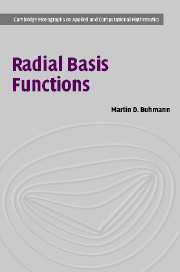Book contents
- Frontmatter
- Contents
- Preface
- 1 Introduction
- 2 Summary of methods and applications
- 3 General methods for approximation and interpolation
- 4 Radial basis function approximation on infinite grids
- 5 Radial basis functions on scattered data
- 6 Radial basis functions with compact support
- 7 Implementations
- 8 Least squares methods
- 9 Wavelet methods with radial basis functions
- 10 Further results and open problems
- Appendix: some essentials on Fourier transforms
- Commentary on the Bibliography
- Bibliography
- Index
8 - Least squares methods
Published online by Cambridge University Press: 14 August 2009
- Frontmatter
- Contents
- Preface
- 1 Introduction
- 2 Summary of methods and applications
- 3 General methods for approximation and interpolation
- 4 Radial basis function approximation on infinite grids
- 5 Radial basis functions on scattered data
- 6 Radial basis functions with compact support
- 7 Implementations
- 8 Least squares methods
- 9 Wavelet methods with radial basis functions
- 10 Further results and open problems
- Appendix: some essentials on Fourier transforms
- Commentary on the Bibliography
- Bibliography
- Index
Summary
In this chapter we shall summarise and explain a few results about the orders of convergence of least squares methods. These approximants are computed by minimising the sum of squares of the error on the Euclidean space over all choices of elements from a radial basis function space. The main differences in the various approaches presented here lie in the way in which ‘sum of squares of the error’ is precisely defined, i.e. whether the error is computed continuously over an interval – or the whole space – by an integral, or whether sums over measurements over discrete point sets are taken. In the event, it will be seen that, unsurprisingly, the same approximation orders are obtained as with interpolation, but an additional use of the results below is that orthogonal bases of radial basis function spaces are studied which are useful for implementations and are also in very close connection to work of the next chapter about wavelets.
Introduction to least squares
Interpolation was the method of choice so far in this book for approximation. This, however, is by no means the only approximation technique which is known and used in applications. Especially least squares techniques are highly important in practical usage. There is a variety of reasons for this fact. For one, data smoothing rather than interpolating is very frequently needed.
Information
- Type
- Chapter
- Information
- Radial Basis FunctionsTheory and Implementations, pp. 196 - 208Publisher: Cambridge University PressPrint publication year: 2003
Accessibility standard: Unknown
Why this information is here
This section outlines the accessibility features of this content - including support for screen readers, full keyboard navigation and high-contrast display options. This may not be relevant for you.Accessibility Information
- 1
- Cited by
